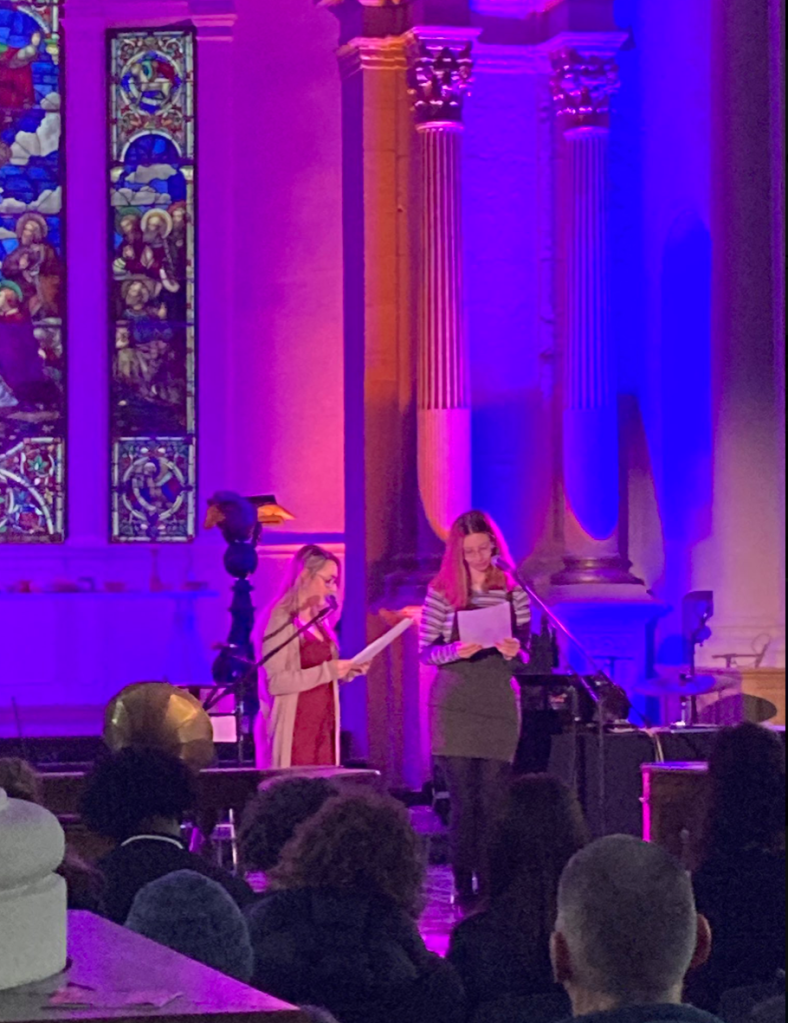We were thrilled and humbled when musician Alison Cotton approached us asking if she could include Hilaire’s poem The Cook Sisters Contemplate a Final Trip to Nazi Germany from London Undercurrents, at her musical event Engelchen in Sunderland. You can listen to an extract of the piece We Were Smuggling People’s Lives on this episode of BBC Radio 3’s Late Junction, starting at around 1 hour 11 minutes in.
Born in the northeast in the 1900s, Ida and Louise Cook spent their childhood years in Sunderland before moving with their family to London and settling in Battersea in 1919. According to Louise Carpenter, who wrote an essay about the sisters for Granta magazine, the sisters’ upbringing, while Christian, was ‛emotionally austere’, and there was no music at home. Ida and Louise had a very close bond, and following the move to London found work in the Civil Service. One lunchtime, Louise attended a music lecture and was bowled over by what she heard. She and Ida saved up to buy a gramophone, and soon became ardent opera fans.
Ida began writing articles for a fashion magazine, and eventually left the Civil Service to become sub-editor of Mab’s Fashions. She soon branched out into writing short stories, and then tried her hand at a serial. While the serial wasn’t suitable for Mab’s Fashions, its editor put Louise in touch with Charles Boon, who snapped it up. Ida would go on to become one of Mills & Boon’s most successful authors, publishing under the pen name Mary Burchell.
Ida’s income from book sales enabled the sisters to travel to Europe to visit opera houses and follow their favourite opera singers. This in turn led to their extraordinary efforts to help Jewish people flee Nazi Germany. As regulars on the European opera circuit, Ida and Louise had become friends with some of the scene’s luminaries, including the conductor Clemens Krauss and his wife, the soprano Viorica Ursuleac. During one of their trips to Berlin in 1935, Krauss asked if the sisters could help the musicologist Mitia Mayer-Lismann and her 17-year-old daughter Else escape. Mitia and Else were the first of 29 Jewish people the Cook sisters were able to help flee the Nazi regime and find safety in Britain. Under the guise of opera-mad sisters they would fly out to Germany on a Friday evening, and return via train and boat at a different border crossing on Sunday night. They smuggled out valuables such as jewellery and fur coats, into which they had sewn British labels, passing them off as their own. These items were the financial guarantees needed by Jewish refugees in order to be accepted by British immigration. Ida also bought a flat in Dolphin Square for those they’d helped to stay in until they were able to find their own accommodation.

Ida and Louise Cook Photo – as pictured in Inspiring Women of Battersea

Jade McQueen and Sarah Templeton reading The Cook sisters contemplate a final trip to Nazi Germany. Photo Alison Cotton
Hilaire’s poem captures the sister’s close relationship, and their dedication to helping people and opera, through an imagined late-night conversation between them as they worry about other people’s lives as opposed to their own. On occasion we’ve read the poem together at live events, as a two-hander, taking a sister’s part each. When Alison asked permission to include the poem, we suggested that two voices might be used at her event. We were so moved when she told us that she’d invited two local female students to read the poem side by side, as seen in this wonderful photo of the event , and that they had been practising together to get it right. The strength of women working together, helping each other out – even when they don’t know each other – is truly a super power we must treasure.
Sadly, neither of us could make it to the event, but judging by the response and success of the night, it won’t be long before it takes place again due to public demand. If it does, don’t miss it!
“Dedicated to refugees both then and now.”
Alison Cotton